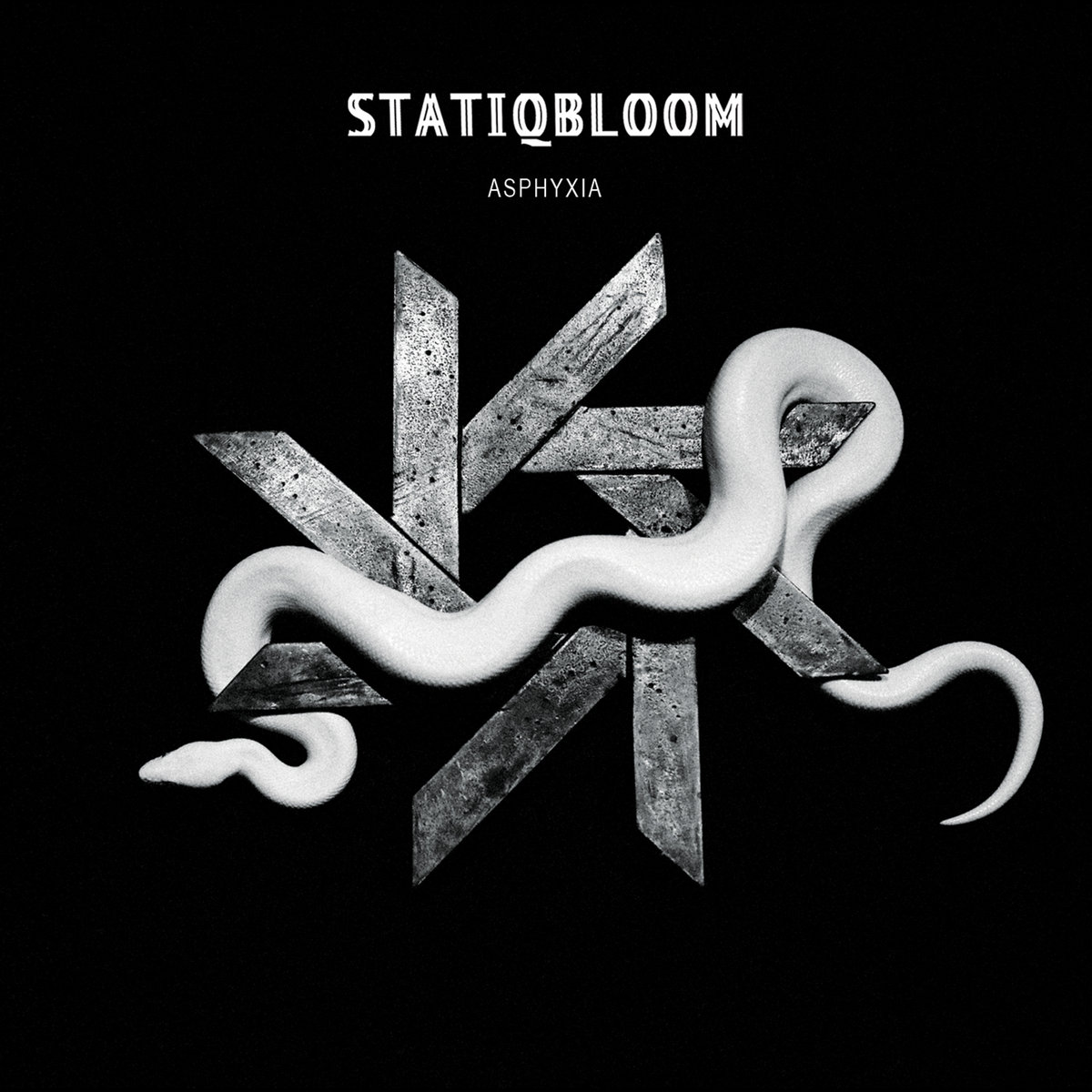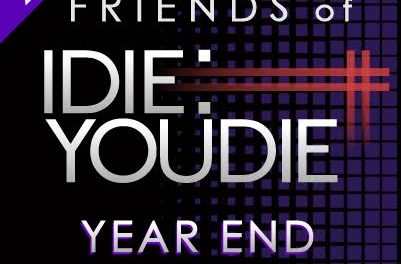
And that’s a wrap on the top 25 releases of 2019. Gotta admit that although we feel strongly about every record we mentioned here over the last few days, this was a particularly difficult year to figure out what made our list and what didn’t. Many of the old paradigms we based the process on – length, amount of unreleased material, actual date of release (digital vs physical) – are feeling pretty difficult to justify in today’s music landscape. Whether that means we’ll be looking at revamping our process, or maybe even completely reinventing it we don’t know yet. Suffice to say that this was an incredible year for records of all the various genres we cover for IDUD. If you tune into WHaT tomorrow you’ll hear us talk some of the releases we liked that didn’t make the list, but before then you’ll want to check our our Top 5 below!
-Best of 2019: 25-16
-Best of 2019: 15-11
-Best of 2019: 10-6

5. Twin Tribes
Ceremony
Negative Gain Productions
If it’s not broke, don’t fix it. Or, in Twin Tribes’ case, if your rituals are still conjuring top-tier darkwave, don’t break the spell. Like its excellent predecessor Shadows, Ceremony excels by making classic darkwave atmospheres and melodies seem like child’s play, with the straightforward delivery of goth stormers like “Fantasmas” and the coolly grooving “Upir” convincing you that there’s some sleight of hand at work: if it were this easy, surely everyone would do it. It’s clearly not that simple, but Luis Navarro and Joel Nino are starting to make it seem as though it is: Ceremony is every bit the record that Shadows was, and delivers just as stellar a clutch of songs while only making slight changes to its style. Still, those minor adjustments should offer intriguing possibilities to those who’ve spent time poring over Shadows (which seemed to be a goodly number of people last year). Both Navarro and Nino show off some new vocal control, allowing for pretty harmonizations on “The River” and “Avalon”, and some extra strands of proper goth rock allow for sharper contrasts with the band’s softer side. Whether it was called down via crystalline magics or not, lightning’s struck Twin Tribes twice. Read our full review.

4. Agent Side Grinder
A/X
Progress Productions/Metropolis Records
There’s a very, very short list of bands that not only survive the kind of sea change that Agent Side Grinder have undergone, but outright thrive afterwards. With the departure of half the band (including distinctive rough-voiced vocalist Kristoffer Grip) in 2017, it didn’t look good for the synth-based post-punk act. Of their available options for their return A/X they chose the most challenging: a complete reinvention. And wonder of wonders, it not only worked, but produced arguably the best record of the Swedish project’s career. The smooth cold-war new wave that defines the LP takes on numerous forms, from the acid paranoia of “Doppelgänger” to the sax-infused dancefloor pulse of “Stripdown”, but each is covered with a slick sheen of neon production that highlights their dancefloor appeal and the power of their hooks. None of which is to say that the record lacks the menace, quirk or melancholia of their previous incarnation; “Decompression” “MM/CM” and “Wounded Star” are classic ASG all the way through, albeit with the right amount of gloss. It’s a consolidation of past and present that draws on the band’s longstanding strengths, and pushes them to the fore with a newfound vigor and appeal no one could have anticipated. The result is one of the year’s best and most compulsively enjoyable listens. Read our full review.

3. Statiqbloom
Asphyxia
Metropolis Records
“Psychedelic HELL”, yells Fade Kainer during one of the best tracks on his second full LP as Statiqbloom, with the wet distortion which smothers his rasp doing an able job of replicating said metaphysical state. It’s tough to imagine a better two-word summation of the dark and unyielding space Kainer has hewn for himself as Statiqbloom (now officially joined by Denman Anderson as a full band member) since 2013. The echoing kicks which often form the bedrock of Asphyxia can still be traced back to classic Key programming, but the lurching, seething noise which broils around them feels like Statiqbloom’s own spin on things, with no small influence from Kainer’s work in other projects and genres (doom metal, death industrial). Kainer has resolutely dedicated himself to excavating the most stygian and mind-warping corners of electro-industrial and dark electro, and with Asphyxia he alchemically draws together all of his hermetic findings into perfect, fearful symmetry. The spiritual and aesthetic ethos of Statiqbloom hasn’t changed much since the days of Mask Visions Poison, but the execution of a blood-drunk beast like “Eight Hearts Eight Spikes” or the previously referenced “Figure Behind The Door” with its ghostly shimmer and murk feels freshly tuned. It’s tough to tell from track to track whether Kainer is raging at himself, a specific person or reality, the sum total of humanity, or just seeking to vent and possibly exorcise nameless choking hate. Read our full review.

2. Boy Harsher
Careful
Nude Club Records
2019 was Boy Harsher’s year for a lot of reasons. Beyond widespread critical acclaim and sold-out shows at home and abroad, there was a feeling that the Massachusetts-based duo were having a proper, inescapable, undeniable moment. It was the release of their sophomore LP Careful that set it off, a collection of almost unbearably personal tracks that rested on a combination of sinister electronic sounds and vocalist Jae Matthew’s soulful vocals. Where the band had flirted with less opaque and ominous sounds on 2017’s Country Girl, this LP finds them at their most paranoid, their most desirous and their most fervent, as dark as anything they’ve ever released. Songs like “Fate” combined simple dancefloor rhythms and leads with a visceral sense of anxious proximity. Whether booming out over club speakers or through headphones, Careful is a record the listener experiences in close-up, inhabiting a space with the band that feels private, as though they’re being played directly to a confidant or lover. That reaching, aching longing is both creepy and intoxicating, a potent mixture of emotions that kept us returning to it again and again, never satiated, and never totally comfortable no matter how many times we listened or danced to it. Boy Harsher are masters of intimacy, never moreso than here, or now. Read our full review.

1. Lingua Ignota
Caligula
Profound Lore Records
Let’s be honest: we had a record like Lingua Ignota’s Caligula coming. The premise of Kristen Hayter’s music has always been one of abhorrence and acrimony, either via blasts of noise and murderous screaming, or a level of weaponized vulnerability that dares the listener to defy it. Caligula doubles down on those vows, directing violence outward and inward with equal vigor at every turn. When Hayter intones “Life is cruel/And time heals nothing/And everyone you love will leave you” in a deathly croak on “If The Poison Doesn’t Take You, My Dogs Will”, it’s a knife that cuts both the audience and performer; Lingua Ignota’s hurt is shared, but never diluted.
It can take a few fraught listens before you can even begin to dissect the musical changes that permeate the record. Beyond the blasts of noise and piano that have been the project’s stock and trade, Kristin Hayter explores neo-classical sounds, albeit via her own tense and acerbic sensibility. The church organ on “Days of Tears and Mourning” is both a connection to Hayter’s liturgical themes and something of a sacrificial lamb, blasted apart as it is by a wave of doomy drums. Similarly, the creaking strings that rise up at the mid-point of standout “Do You Doubt Me Traitor” gather weight and sorrowful emotion together into a single mass before Hayter drops the axe, cutting through everything with alternating screams and righteous accusation and threats. It’s strong stuff to be certain, but not entirely without moments of succor; the harpsichord on “Fucking Deathdealer” acts as a simple, comforting counterpoint to the charged lyrics, especially as a lead in to the emotionally devastating closing track “I Am the Beast”.
The record’s themes only amplify its musical weight and nuance. It’s one thing to speak of the personal and the political being inseparable in a contemporary context, but Hayter explodes this precept outward to an extraordinary degree: Caligula‘s examination of suffering, persecution, and wrath envelops the spiritual, metaphysical, and ontological, smashing together past and present, the subjective and the universal. The casting of Aileen Wuornos as a medieval martyr, Hayter’s conjuring of Satan to offer succor, the use of hymnal rhetoric to reckon with rape: all these audacious moves could prove disastrous in the hands of a less considered composer, a less commanding vocalist. But Hayter’s reach never exceeds her grasp and every single one of her blows strikes with fury, whatever the target.
Like no other record this year, Caligula cast an awful (in the original sense) shadow over us. To fall under it was to be changed, to begin to see new horror and strength beneath the surface of the everyday. Whether you read it as empowering or crippling, its impact was undeniable. Hayter’s music may have strong roots in the industrial and noise traditions, but its resonance with broader scenes and audiences speaks to her talents at bending sound and style to her will and, sadly, to how common her concerns and experiences are. With Caligula, Hayter’s name is writ large in the sky with flame. Tremble beneath it.






Thanks as always for all the hard work putting this together. Lots to catch up on. Some favourites here, the Silent EM, Body of Light, Boy Harsher, Wingtips. Got a lot of mileage out of the last Drab Majesty too. Gonna go check out the podcast….
Thanks for checking out the list!
No FIRES, Glass Apple Bonzai, the Present Moment, Xarah Dion and, a personal favourite, no Acretongue, and yet it’s a brilliant list with which I cannot argue. If that doesn’t speak to the quality of material released in 2019, I’m not sure what does. Thrilled to see Agent Side Grinder ranked that high.
Guys, as always, cheers to you for all that you do. 3/4’s of what I bought this year came by way of your site/recommendations.
Albums not reviewed by this site that I loved include Caustic Grip’s “The Descent”, Blind Seagull’s “Cold Hands”, Iris’ “Six”, Reduction Plan’s “(Ae) Maeth”, Lucifer’s Aid’s “Panic”, and Strvngers’ “Death is the Only Way Out”.
Finally, just curious… if both EPs by Klack were released as an LP, where do you think that album would have ranked?
The Klack question is a good one… I guess around the mid-upper teens? Listened to those EPs a lot this year!
Quite a few of these albums are genuinely good picks but cynically I wonder how many they were picked solely for “Woke” points and or because of friendship bias? I admit I need to listen to Spit Mask I saw them live supporting Nitzer Ebb and their live mix was TERRIBLE so I wonder if they’re better on record. Someone at the gig said they was top 10 in current Industrial bands. I wasn’t impressed only one track I really liked out of their whole set.
I don’t know too much hype by hipsters and mediocrity only chosen because of artists using fad politics or they fit intersectional demographics these days in alternative music scenes.
Maybe I should buy a MicroKorg off Reverb and scream about Feminism? Maybe you guys would give it top marks. 😉
Also no Drab Majesty?
100% fact that an artists politics speaking to us personally will influence their placement on our list. We aren’t objective, nor would we claim to be. That said, I can assure you we don’t care about “woke points”. We feel how we do.
And yeah, you should check the Spit Mask record out. I think it’s pretty great gritty stuff!
I’m sure friendship bias comes into play but if that was the primary criterion used to construct this list, I assure you that bands such as FIRES, GAB, Numb and Cubanate would have been better represented here. Don’t all sites such as this have friends they wish to support?
That said, I assume that your comments referred to Lingua Ignota’s place atop this list and I’ll admit it wouldn’t have been my choice. To be fair, I never really gave it a chance when it came out. So, I sat down yesterday with three fingers of scotch, eliminated all distractions (other than scotch), and blasted it through my house (much to my daughter’s chagrin). My takeaway is this: I wonder if Bruce and Alex chose it because of Kristen’s devastating live performance of this material rather than albumcraft. I remember reading/listening to their reactions to her live set and “blown away” does not begin to describe them. So, as an album, it was interesting (and exhausting!) but not something I’d revisit. However, maybe this really wins “performance of the year”; I’d witness this live in a heartbeat. Come to Toronto Kristen.
Hey guys, here’s my yearly Mixcloud rendition of your Top 25. I hope you like it and that it will be useful to further promote your countdown. Cheers from Costa Rica: https://www.mixcloud.com/soulmanager/i-die-you-die-best-of-2019-top-25/
If friendship was really a deciding factor in placement then the Fires record would be on here I reckon. I don’t like “Caligula” as a record personally but I still am not arsed to argue because it speaks to a wide variety of people
Liked and loved much that was released this year. Especially recommend:
Kontravoid – Too deep
Fix8:Sed8 – warnings signs
HEALTH – Vol. 4 :: Slaves of Fear
Blanck Mass – Animated violence mild
Kris Baha – Palais
Tamaryn – Dreaming the dark
Scorn – Cafe Mor
I DIe:You Die top 25 sounds more “re-focused” to my ear this year. Very nice selection indeed.
Electraumatisme Top 10 – 2019 in reverse :
10 – My Love Kills – Glitch
09 – Amnistia – Black Halo
08 – Spark! – Chaos
07 – Velvet Acid Christ – Ora Oblivionis
06 – Test Dept – Disturbance
05 – Statiqbloom – Asphyxia
04 – Luminance – Ahead
03 – First Aid 4 Souls – Keep this world empty
02 – Circumpolar – Until the End of Time EP / We Will Remain EP
01 – FIX8:SED8 – Warning signs
french speaking podcast here :
https://electraumatisme.blogspot.com/2020/01/playlist-electraumatisme-du-03012019.html
There’s a bunch of records on your list we need to check out! Thanks for sharing! 🙂